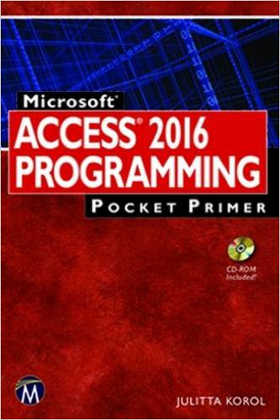| Access 2016 Programming Pocket Primer |
|
Author: Julitta Korol This is a book designed to get people started on the fundamentals of Access programming, but it ignores the parts you really need to know. Access has one of the richest programming environments for database programmers, because you get access to all the elements such as tables, queries, forms and reports, and can control them from your code. Unfortunately, this book doesn't teach how to do any of this, instead taking a standard programming approach.
The book opens with a chapter introducing Access VBA, the different types of Access procedures and modules. How well a complete novice would cope with this is hard to tell, and I think it might have been clearer if this chapter had come later in the book once the Visual Basic editor and Access VBA fundamentals had been introduced. The second chapter, which covers the Visual Basic editor followed by Access VBA Fundamentals, is where Korol introduces data types, variables and constants. A chapter on built-in and custom functions is next, followed by an introduction to conditionals - If and Case. The next chapter covers the different types of loops, starting with Do..While and Do..Until, then going on to For loops. Arrays are tackled next, including parameter arrays, with a chapter on object collections completing the main material. The book ends with a chapter on the built-in tools for testing and debugging. There is some good material in this book, but some of the more advanced topics seemed out of place in a pocket primer that describes its aim as 'a short book to get you started'. If a reader needs to be told what a variable is, or a simple If statement, it's going to be quite a while before they're likely to want to tackle parameter arrays, custom functions or object collections.
More worryingly, the material you really are going to need if you want to write Access code - how to interact with Access tables, fields, queries and reports - isn't covered at all. I could find just one mention of Access storing data in tables. There was no coverage of concepts such as RecordSets, Database objects, making connections to databases and database objects. There's no mention of DAO versus ADO, and which one to choose. When describing form creation, the controls are set up as unbound, and while you're shown how to assign values to an object collection, there's no mention of how to assign values to actual fields in tables. Access is a great programming environment, but this book ignores the parts that make it great, and treats it instead as just a classic programming language.
To keep up with our coverage of books for programmers, follow @bookwatchiprog on Twitter or subscribe to I Programmer's Books RSS feed for each day's new addition to Book Watch and for new reviews.
Related ReviewsAccess 2010 Programming by Example with VBA, XML and ASP Access 2010: The Missing Manual Access 2013: The Missing Manual
|
|||
| Last Updated ( Thursday, 14 July 2016 ) |

